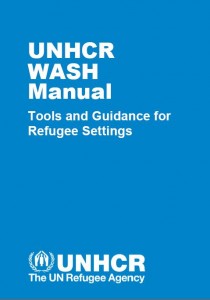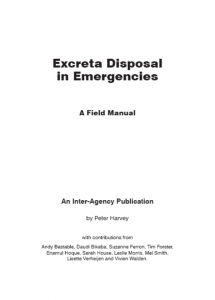
The purpose of the manual is to provide practical guidance on how to select, design, construct and maintain appropriate excreta disposal systems in emergency situations. Relevant situations include natural disasters, relief for refugees and Internally Displaced Persons (IDPs), and complex emergencies, focusing on rural and peri-urban areas. The manual presents a process, which can be followed to assess the current excreta disposal needs and priorities, and to design an appropriate programme to respond to those needs. It can also be used to select appropriate excreta disposal technologies, systems, and hygiene promotion interventions. The manual provides guidance on how to plan, design and construct systems, and how to maintain and promote appropriate use of those systems.

Refugees are at high risk for communicable diseases due to overcrowding and poor water, sanitation, and hygiene conditions. Handwashing with soap removes pathogens from hands and reduces disease risk. A hepatitis E outbreak in the refugee camps of Maban County, South Sudan in 2012 prompted increased hygiene promotion and improved provision of soap, handwashing stations, and latrines. We conducted a study 1 year after the outbreak to assess the knowledge, attitudes, and practices of the refugees in Maban County.
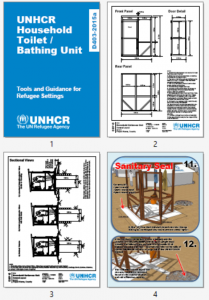
This document contains documentation to help UNHCR and WASH actors build household toilet and bathing units (domed slab) in refugee settings. The package includes: Technical Drawings; Step by Step Construction Drawings; Bills of Quantity; Material and Workmanship Specifications; and Design Calculations.
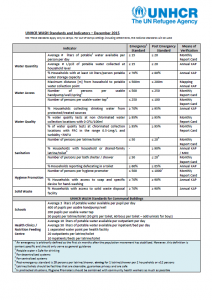
A summary of UNHCR water, excreta management, solid waste management, disease vector control and hygiene promotion standards and indicators for emergency and post emergency refugee settings including means of verification.
Tags: Bathing Facilities, Disease Vector Control, Drainage, Excreta Management, Handwashing with Soap, Hygiene Promotion, Solid Waste Management, WASH Assessments, WASH Monitoring, WASH Strategy Development, Water Quality Testing and Surveillance, and Water Supply. Languages: English. Organisations: UNHCR. Categories: WASH Indicators and Standards.
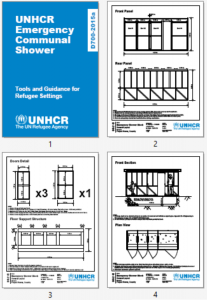
This document contains documentation to help UNHCR and WASH actors install emergency communal shower blocks (wood and plastic) in refugee settings. The package includes: Technical Drawings; Step by Step Construction Drawings; Bills of Quantity; Material and Workmanship Specifications; and Design Calculations.

This technical brief is intended to provide guidance for UNHCR staff and Partners involved in winterization of WASH facilities in the current European refugee and migrant situation.
Tags: Bathing Facilities, Cold Climates, Cross Cutting, Excreta Management, Hygiene Promotion, Piped Water Networks, and Water Supply. Locations: Central Europe and the Baltic States, Eastern Europe, and Europe. Languages: English. Organisations: UNHCR. Categories: WASH Emergency Guidelines, WASH Emergency Tools, WASH Guidelines, WASH Operational Guidelines, WASH Policy Guidelines, and WASH Reference Documents.
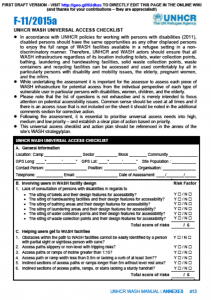
This document has been designed to help UNHCR and WASH actors assess WASH infrastructure for potential access from the individual perspective of each type of vulnerable user in particular persons with disabilities, women, children, and the elderly.
Tags: Bathing Facilities, Communal Toilets, Cross Cutting, Disability, Laundering Facilities, WASH Assessments, WASH Monitoring, WASH Programme Management, WASH Strategy Development, and Water Supply. Languages: English. Organisations: UNHCR. Categories: WASH Blank Forms, WASH Operational Guidelines, WASH Policy Guidelines, and WASH Reference Documents.
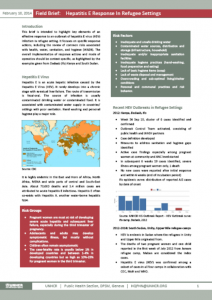
This brief is intended to highlight key elements of an effective response to an outbreak of hepatitis E virus (HEV) infection in refugee setting. It focuses on specific response actions, including the review of common risks associated with health, water, sanitation, and hygiene (WASH). The overall implementation of response actions and mode of operation should be context specific, as highlighted by the examples given from Dadaab (Ifo) Kenya and South Sudan.
Tags: Bulk Water Treatment, Excreta Management, Handwashing with Soap, Household Water Treatment, Hygiene Promotion, Public Health, Water Quality Testing and Surveillance, and Water Safety Plans. Locations: Africa, Dadaab, East and Horn of Africa, Kenya, South Sudan, and Sudan and Chad Special Operational Region. Languages: English. Organisations: UNHCR. Categories: WASH Emergency Guidelines, WASH Guidelines, WASH Operational Guidelines, WASH Policy Guidelines, and WASH Reference Documents.

These WASH related primer questions have been designed to assist UNHCR and WASH actors collect data from key informants and focus groups during WASH assessments. The list of questions is not exhaustive and is merely intended as a conversation primer (aide memoire).
Tags: Excreta Management, Human Right to Water / Sanitation, Hygiene Promotion, Protection, Public Health, Solid Waste Management, WASH Assessments, WASH Monitoring, WASH Strategy Development, and Water Supply. Languages: English. Organisations: UNHCR. Categories: WASH Blank Forms, WASH Emergency Guidelines, WASH Emergency Tools, and WASH Reference Documents.
 English
English










